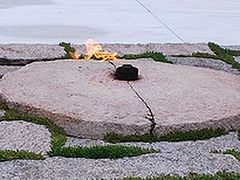In Part 1, Fr. Pavel Gumerov spoke about a severe case of slavery to anger, and in Part 2 he discusses how ruinous anger can be in our lives, and how to war with it.
Well, and now the most important thing. It is not enough to simply learn to bottle up anger and hold it back. This is important, but not enough. It is just the same as if we were to remove only the symptoms and consequences of a sickness, but not heal it. What is the main medicine against passion? Implanting in the soul the habit of virtue, the opposite passion. St. Ignatius (Brianchaninov) and many other holy fathers wrote about this. Nature abhors a vacuum. It’s not enough to only cast out anger and stop getting irritated. And it is almost impossible—it will anyway burst up to the surface from the depths of our souls where we had stuffed it. The habit of getting angry, irritated, and condemning should be transformed into another steadfast habit, another dominant. Which one? Forgiveness, compassion, sympathy with people, understanding, patience, and humility. Basically, these are all manifestations of one great virtue—love of neighbor. Love is also the opposite of the passion of pride. And from pride, as we know, comes anger. “In conquering pride you conquer all the passions, and to the heart come humility and love,” says St. Paisios the Athonite. We have to remember that passion is a very persistent sinful habit that has become a part of the soul, and in order to expel it we need a great deal of work on burning out the passion, a direct battle with it, and the acquisition of steady habits of the virtues. This cannot all be done quickly. A chronic illness that has been around many years cannot be healed in two weeks—it takes time. Therefore we must never give up and fall into despondency if we do not see any serious results yet. Falls, upsets, and repeat offenses are inevitable on this path. But the longer and more stubborn the fight, the stronger the new habit will be.
Now a little about how to change your relationship to you neighbor to the opposite of irritation and anger. It is very useful to put yourself in the place of the person who is making you irritated, to try and understand the real motives behind his actions. Not long ago a young man came to me for confession and told me that he gets very irritated at uncivilized drivers who create dangerous situations on the roads, who “cut off” other cars, take cuts in lines at the lights, and so on. Well he just can’t stand it! Then I asked him, “Do you yourself always observe the traffic rules and never break the them?” He said that of course he does break them here and there, but he still can’t understand how they could drive so carelessly. Then I mentioned an example that I hope helped him change his attitude to reckless drivers. Imagine that the person who just cut you off, passed you, or took cuts in line at the light had just received a call from his pregnant wife that she is going into labor and needs a ride immediately to hospital, or that their child is sick. There could be any number of reasons! Of course, there is nothing good about breaking traffic rules, but for some reason we always think that every speeding driver is a dare devil and a road hog. But this is far from the truth. I repent of it, but there are times when I break the traffic rules. For example, once I was hurrying to get to my suddenly sick wife, or when she called me and told me that our son had spilled boiling water on himself. I suspect that many other drivers did not approve of my driving style.
We very often rush to condemn a person not knowing his true motives for his truly unseemly deed, instead of trying to understand his behavior and what might be behind it. We have all been raised in completely different families; we have different life experiences, education, inherited traits, health, and life conditions. Everyone has his own entirely individual life situation that may be different from ours. We think that a person wanted to insult us but perhaps his parents simply raised him wrong, and we were luckier in that respect. I think that if we do this we will begin to have pity on our neighbor, and it will be easier for us to forgive him. Only when you know a person well enough can you partially understand what is really behind his actions. Although we will never know everything, for even the person himself does not always suspect what truly motivates his behavior. Only the Lord knows the heart of man and therefore only He can judge him—but we in no way can.
But we must always strive to see in our neighbor the good side and traits that are definitely present in every person. Almost every person has some knowledge, abilities, or character traits that we do not have but wish we did. Noticing all this, we understand that associating with him might bring us no small benefit.
In this way we turn the dial to the person’s other sides and will not notice what is unpleasant to us. If we have already been associating with these people for a long time, we can remember all the good that they have done for us. There is yet another way to get close to someone and change our relationship to him for the better—by doing something nice for him. Even if a certain individual is not only unpleasant to us but even at enmity with us, we have to remember that evil can never be conquered by evil, as the Apostle Paul says, (cf. Rom. 12:17), “but conquer evil with goodness,” he writes (Rom. 12:21). There is a children’s cartoon about a little raccoon who is “afraid of the one who sits in the pond” (his own reflection), and made terrible faces in order to scare him. But he himself got even more afraid, because his reflection in the water was also making grimaces. But when he smiled at him he was able to get over his fear, because “the one who sits in the pond” smiled back.
After all, sometimes just by smiling or showing patience we can do a good deed for the one who is irritated with us, and most importantly we ourselves change our attitude toward him.
During different periods of my life I at times have had long telephone conversations with sick people—either psychologically ill or with some other serious illnesses. I will not hide the fact that these conversations often exhausted me greatly and provoked irritation. But when I tried to put myself in the place of these unfortunate, sick people I felt better. I understood that these long phone conversations were one of the few accessible joys they had. They simply did not understand (because they never worked anywhere or had their own families) that they were taking the time of a busy, family man.
It is known that the traits in people that irritate us the most are those that we dislike in our own selves. Often anger is hidden guilt. It is simply used unconsciously to cover up other feelings. That it, we were once very ashamed of a similar thing that we did, and now that we see something similar we are very irritated and don’t like it. This mirror effect is remarkably well described in the famous fable by Krylov, “The Monkey and the Mirror”. We recall Mishka’s advice: “Why are you wasting time counting? Wouldn’t it be better for you to look at yourself?” That is, we have to admit that we ourselves are far from sinless and we have done something like that in our own lives.
In order to deal with dislike, anger, and insult it is very helpful to pray for those who call forth these feelings in us. After all, this is what Christ commanded us to do whey He said, Pray for those who offend and persecute you (Mt. 5:44). This is a tried and true method, and the Lord makes peace even between people who are sworn enemies. Besides, when we pray for those who irritate us we begin to sympathize with them and the offended feelings go away.
Anger can be provoked in us by people’s behavior, but also by other external factors, situations, and events of our existence. We need to change how we relate to all of this, to transform the negative to the positive. We need to learn how to analyze the events, always see in them not a senseless chain of haphazard circumstances but God’s Providence leading us to salvation. It is necessary to understand that all trials have great meaning for us and even in very difficult life situations we can find great benefit and gain priceless experience. In any work, any occupation, even the most dull and routine, we should learn to find something useful and pleasant for ourselves and receive some pleasure from it.
“My sin is ever before me”
In conclusion I would like to say something very important and at first glance unpleasant, even “frightening”: A person can never be completely freed from a single acquired passion. But I will warn you right away—there is no need to get frightened before the time. Why can’t he be freed? First of all, because man can only conquer the passions with God’s help. Therefore he has to begin his struggle with and healing from them through the awareness of his own infirmity. But conquering does not mean killing and completely freeing oneself from passions. No, with God’s help, one can only bind the passion, bridle it, like a wild animal.
Secondly, having bound the passion, having made it harmless to ourselves, we will nevertheless never be able return to our original state previous to acquiring the passion. Thus an alcoholic or drug addict cannot stop being a “substance abuser” or return to his original position—that is, the state that people are in who never knew such sad experience. Negative experience, the inclination or tendency towards dependency, and the consequences of illness will always be with us. Someone who has gone through a serious illness of the stomach should observe a diet and regime for the rest of his life. A person who spent his youth in fornication not only will never become a virgin, but the consequences of his sins will be felt the rest of his life. Life experience and human memory cannot be reset like a computer, and you can’t just install a new operating system in place of the corrupted one. People who were bound by passions and found themselves in long remission should definitely remember their “problem spots” all their lives. Then the passions will stop be dangerous for them. Because your adversary the devil, as a roaring lion, walketh about, seeking whom he may devour (1 Pet. 5:8). This means that we have to place a border patrol around our souls and always be alert.
But I repeat, there is no need to fear. The Lord establishes everything for our benefit. If we had the possibility to completely erase our past sinful experience and, having received complete healing of it, we would nevertheless quickly return to it. We could also fall into pride, thinking that we ourselves, through our own strength overcame the passions. But this way we bear the consequences of our passion like a penance and will always sense our own weakness, never forgetting about them. For I know my iniquities and my sin is ever before me (Ps. 50:5). And this is not bad. After all, we need to suffer a little bit in life for our sins in order to be free from suffering for them in eternity.
And one more point. One who has lived through the experience of struggle with the passions and knows his weakness will be more ready and armed against it than one who has no such experience. He can even help others in their struggle against the passions. And the probability of repeating the sin for a man leading a constant war against sinful dependencies may be much less than for one who has never fallen into it.
I wish all of us God’s help in warring with the passions this coming year!









For we do not know the heart;
We can often be mistaken,
Since we only know in part. (Fitzhugh)